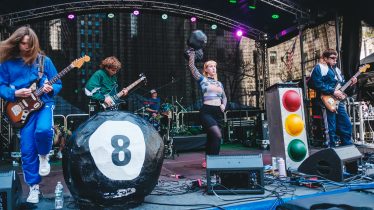Web exclusive: A conversation with David Moore of Chamberlain
Fate’s Got A Driver in 1995 marked a major transitory time for SPLIT LIP, a defining band of the ’90s hardcore movement. The band changed their name to CHAMBERLAIN amidst a vocal re-recording of their sophomore full-length and moved from hardcore territory into something characterized far better by melody and restraint. Chamberlain would endure more surprising transformations over the course of the years that followed, but Fate’s Got A Driver remains a diamond-in-the-rough album for ’90s underground music. This week, Doghouse Records shed deserved spotlight on the album with a vinyl reissue, pressed on colored wax, including a few bonus tracks for good measure. While the band have a spate of reunion shows planned in support of the reissue along with the release of the book Burning Fight: The Nineties Hardcore Revolution In Ethics, Politics, Spirit, And Sound by Brian Peterson. BRIAN SHULTZ recently spoke with Chamberlain frontman DAVID MOORE about the band’s history, the reunion and his long-gestating solo record.
What happened just after Split Lip released the original Fate’s Got A Driver?
We put the record out…the way I remember it, anyway, we had recorded the album. I was never fully pleased with the initial recording. In the days after the session, I felt that I could’ve done better work. [Laughs.] It was kinda unsettling to me for quite awhile. I eventually convinced the record label to let me go back in and re-record the vocals on the original tracks. It was kind of a good shift from the Split Lip moniker to the Chamberlain name, so we kinda used that as a jumping-off point. We wanted to change the name of the band, and unfortunately we hadn’t had the foresight to do that prior to releasing the record. So [we] just thought we’d re-release it–re-record the vocals and change the name all at once. I don’t know that any band have ever had the same record released under two different band names. [Laughs.] But that’s what we did.
Her Side Of Sundown – Chamberlain
What specific problems did you have with your vocals on the original version of Fate’s Got A Driver?
Really kind of the same ones I had with the vocals after we re-recorded them. [Laughs.] I thought that I could go in and make a broad stroke and a big difference in the sound of the vocals. In hindsight, it didn’t really happen. It just didn’t sound the way I’d envisioned it in my head. I was never good in the studio. It was just recently with my solo stuff that I’ve gotten comfortable with the process of making records in a studio. It always felt like hanging out in a museum to me, particularly with the kind of music we were playing back then. It was really hard to translate onto a record. It didn’t sound the way I sing the songs live, and I think that’s what bothered me most. But I don’t think I really made that much of a difference on the second go-around. [Laughs.] But it was worth a shot.
What do you think happened when Split Lip made that first major musical transition just prior to Fate’s Got A Driver?
Well, we were writing these in what seems like a vacuum. Obviously, bands that were around at the time and certainly that style of playing influenced us. After we’d go on the road and come back home, we just would hole up and write songs that really had a broad range of influences. Our individual tastes were very distinct– throughout the whole ten years of the band, all of us had really, very different musical influences. So I think when that all came together, it made something interesting. We had a little house in Bloomington, Indiana, where we would practice and write a lot of those songs and then we also had this log cabin up in the middle of nowhere that we’d [move] ourselves into and write for a long time. I think that sort of isolation informed a lot of the songs on that record.
Uniontown – Chamberlain
Who were the "bands at the time?”
We were really influenced for a while on Fate’s Got A Driver with a lot of D.C. stuff: Fugazi and Rites Of Spring. I was a huge Soulside fan, and I loved Bad Brains and 7 Seconds. Those were the big ones around that time, particularly when Fate’s Got A Driver was being written.
What happened with the next major transition to The Moon My Saddle?
We’d felt like the sort of post-hardcore thing had run its course and we were looking for new territory to explore. A lot of the songs that ended up on The Moon My Saddle in their initial sketches probably sounded a lot more like Fate’s Got A Driver songs. Then I remember Adam [Rubenstein, guitar] and I really focused on boiling them down to–for lack of a better word-formulaic, traditional structures. We had never really written songs that were just verse/chorus/verse/chorus/bridge/chorus. [Laughs.] There was always some strange musical turn that had to occur, and we sort of took all that out of the writing process. I think we were just looking for new territory, and again, that isolation that Indiana offered us. We were probably part of the scene, but not wholly committed to it at the time. We just kinda wrote what we were feeling. I’m sure we had a conscious knowledge of the fact that it was gonna be received in a vastly different way than Fate’s Got A Driver, but we didn’t fully realize the impact of the change that had occurred musically until the album had come out, and with it came reviews and people who weren’t all that thrilled about it. It took some time for people to digest The Moon My Saddle, and understandably so. It was quite a venture for us.
What bands were you listening to at the time that might have helped sparked that transformation?
I had gotten a lot more into what I kinda had grown up on, which was a lot of singer/songwriter stuff. Bob Dylan was a huge influence and still is. Cat Stevens, [Bruce] Springsteen–I probably started to delve a little bit more into that type of stuff. Tom Waits was a big one. So what came out of it had sort of an alt-country vibe to it, or at least, that’s what people tended to write about it. For us, it was more just trying to strip the songs down to their lowest common denominator and keep them there. I think I’d learned to sing a little better by that time, so that obviously changes the way you write songs, right? We made a conscious effort to focus more on the vocals than what the lyrics were saying and actually being able to hear everything the song’s trying to articulate.
The Simple Life – Chamberlain
Have there been any attempts to reissue the early Split Lip youth crew stuff?
Uh, no. [Laughs.] Who knows, though? But no, there hasn’t been any attempt to do that to date.
When and how did reunion talks first come up?
I made a solo record, which is coming out in June, and have been playing a lot of shows to promote that. I was doing a show at the South By Southwest Music Festival and Curtis [Mead], our old bass player, was doing a show with his band there. [Drummer Charlie Walker] was doing a show with his band and Adam was playing with me that night. So the four of us were all gonna be in Austin, Texas, on the same night and I believe I was the last person to play at the club that I was at. We decided to all meet at that club after my show–and we had maybe 20 minutes to cram and try and remember what we were doing–and we ended up playing three or four songs that night. The reunion shows that are coming up in a couple weeks came about really more because there’s a guy [Brian Peterson] who’d written a book [Burning Fight: The Nineties Hardcore Revolution In Ethics, Politics, Spirit, And Sound] about that pivotal time. So we were really going out to celebrate his book release, and we decided to tack on a couple extra dates.
How long has your solo album been in the works?
Adam and I have been working on it from the ground up probably for about three years now. Before we knew it, we had this batch of songs that sounded great to us. We went to a studio in Nashville and recorded this album and have kinda been working to get it off the ground ever since. So it’s finally coming out on I think on June 22.
Prior to that, had you been writing songs that were never really intended for Split Lip or Chamberlain?
Yeah, there were songs that I would write that probably wouldn’t have fit all that well with the band. Adam had the same thing. A lot of times I know he would have material that he would probably keep close to himself rather than bring it to the band because it just didn’t quite fit. I think both of us were afraid of the song turning into something it wasn’t supposed to be. I would write songs quite a bit, and then once the band was done, I kind of forgot about music for many years, and started a family and just kinda focused on other things. But every once in a while, I’d pick up a guitar and start writing.
Do you foresee Chamberlain doing more extensive touring in the future, or even recording?
No, I don’t foresee it. I would be lying if I said it hadn’t bubbled up to the front of my mind a few times as we’ve prepared for these upcoming shows. I’ve been wondering what it would be like just to write a new song together, let alone go into the studio and record something. So no, I don’t foresee that happening. We’ve probably all given it some thought, but logistically and realistically I don’t think we’d want to retread that ground again. I think this current process of reissuing Fate and doing the reunion shows for us is kind of a way to finally put it to rest and probably heal a couple wounds. [Laughs.] I think it’s not the beginning of something as much as it probably is the final conclusion of all that’s passed. alt








